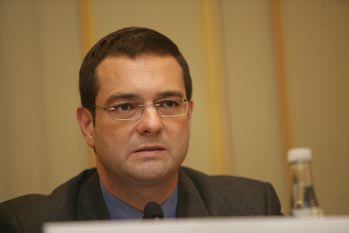 |
| Thaddeus Burns of GE spent months trying to derail the WIPO treaty for the blind negotiations |
The attached document is an 3-page communication dated May 2, 2013, from GE’s senior counsel, Thaddeus Burns, to US Ambassador Betty King (U.S. Ambassador to the United Nations in Geneva) requesting the United States to postpone the Marrakesh Diplomatic Conference to Conclude a Treaty to Facilitate Access to Published Works by Visually Impaired Persons and Persons with Print Disabilities.
The email, sent directly to Ambassador Betty King, was also cc’d to Shira Perlmutter (USPTO), Todd Reves (USPTO, State), Karin Ferriter (USTR, USPTO), and Karan Bhatia (GE Corporate), and Carl Horton (GE Corporate).
Mr. Burns expressed the following concerns to Ambassador King:
At this point in time I wanted to alert you before we meet this week with USG agencies in Washington: US industry is very concerned about the direction the negotiations have taken, and the likeihood of a premature and incomplete outcome in Morocco in June.
The treaty as currently drafted does not reflect the appropriate balance between copyright protection, on the one hand, and L/E to copyright protection, on the other hand. The international copyright infrastructure is fundamentally based on such balance. By casting it aside, the VIP Treaty could set a very harmful precedent, affecting broader debates about global IPR rules at the UNFCCC, WTO, WHO, WIPO, and elsewhere. It is crucial that the VIP Treaty be consistent with existing international IPR agreements, including the Berne Convention, the WIPO Copyright Treaty, and the WTO TRIPS Agreement.
The VIP Treaty, in its current form, is strongly supported and advanced by the same group of NGOs and advanced emerging economy countries that pursue a general IPR-weakening agenda at WIPO and other international forums. As currently drafted, the VIP Treaty would create a harmful precedent that could be relied upon by IPR detractors in other talks, including at UNFCCC, WHO, and WTO.
On process, Burns proffered the following advice to the US:
It is unlikely that all the of the flaws in the current VIP Treaty can be addressed now and the June Diplomatic Conference. As such, the only option at this time may be to to postpone the Conference and to continue negotiation until an effective and acceptable outcome can be achieved. I understand that there is a meeting taking place next week to be convened by the Mexican Ambassador. Our coalition of trade associations and companies are presently reaching out to other key negotiators including the EU, Germany, Australia, Japan, Mexico, Brazil and others to make this point in the hopes that Ambassadors in Geneva might prevail upon on Francis Gurry to allow negotiators to continue towards a more workable text to be agreed upon in a diplomatic conference at a later date.
As a postscript, the Marrakesh treaty did finish its negotiations on June 28, 2013, and became the first user rights copyright treaty. 51 countries signed the treaty on the first day it was open for signature, the most for any IPR treaty, ever. The United States signed the treaty on October 2, 2013.